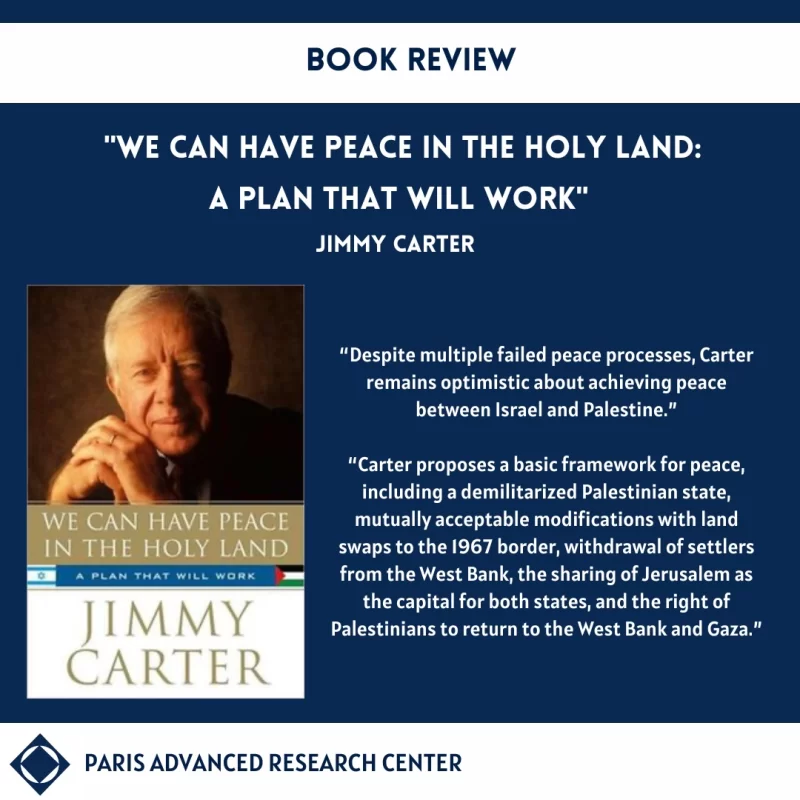
We Can Have Peace in the Holy Land: A Plan that Will Work
Reviewed by Nevzet Celik
In his book, Jimmy Carter explores the enduring conflict between Israel and Palestine, providing insights from his experience as a former U.S. president. Known for his strong religious beliefs, Carter took a special interest in the tensions within this holy land, significant for Islam, Judaism, and Christianity. He made sincere efforts to promote peace, not just during his time as president but throughout his entire life, notably through initiatives like the Carter Center.
From 1977 to 1981, Jimmy Carter held the position of the 39th President of the United States. In recognition of his efforts to seek peaceful resolutions to global conflicts, promote democracy, and uphold human rights, he was honored with the Nobel Peace Prize in 2002. His notable achievement included successfully mediating a peace agreement between Egypt and Israel, addressing the longstanding Israeli–Palestinian conflict.
In his book Carter summarizes the peace process in his book since he was president, explaining his effort to end the conflict between Israel and Palestine and the difficulties he faced. His efforts during the Camp David summit and meeting with Egyptian President Anwar Sadat and Israeli Prime Minister Menachem Begin were crucial to achieving the agreement.
President Carter's dedication to promoting peace between Israel and Palestine continued after the end of his presidency and has been carried on through his The Carter Center. During the Camp David Accords in 1979, Israel agreed to withdraw its army from the West Bank and Gaza and grant the Palestinians "full autonomy" and a right to participate in the determination of their future. Egypt and Israel also agreed to mutual recognition, Israel's withdrawal from the Sinai Peninsula, and Israeli ships' use of the Suez Canal. Carter was unable to put much effort into implementing the Camp David Accords due to the Iranian hostage crisis, which consumed his attention and resources.
Carter emphasized that the United States has consistently supported Israel since his administration. Despite this backing, the U.S. has actively pursued a resolution through a two-state approach, urging Israel to withdraw from East Jerusalem and other occupied territories. A key motivator behind these initiatives is the U.S.'s strategic interest in the Middle East, particularly its concerns about oil. The Gulf War in January 1991 further intensified the U.S. focus on controlling oil resources in the region. Notably, in 1994, Bill Clinton, Yasser Arafat, and Yitzhak Rabin were collectively awarded the Nobel Peace Prize for their accomplishments in this context. The USA perceived the Israel-Palestine conflict as a major factor, with public opinion polls in the Arab world indicating that the United States was considered a greater threat than Iran. However, once again, in 2000, the second intifada erupted when Ariel Sharon visited the Temple Mount Mosque.
The roadmap for Peace in 2003, later known as the Geneva Accord, aimed to address the Israeli-Palestinian conflict by addressing the status of Jerusalem, the removal of Israeli settlements, finding a solution for the refugee issue, ending violence, fostering peace between Arab nations and Israel, and implementing land swaps in the West Bank. The West Bank, in particular, became a major problem after Israeli settlements, as Carter points out, "In many places, the barrier prevents Palestinians' access to their fields, grazing lands, schools, or places of worship. Some cities, including Bethlehem and Qalqilya, are almost surrounded by the high wall" (p.68). Carter emphasizes that the wall in the West Bank is a significant impediment to peace. In 2001, the International Court of Justice declared the construction of the wall in Palestinian Territory "Contrary to International Law." Furthermore, "The International Community, including the International Court of Justice, United Nations, International Red Cross, all European nations, the World Council of Churches, Amnesty International, Human Rights Watch, B'Tselem, and other human rights organizations, is almost unanimous in condemning the placement of the barrier as illegal.”
In his book, Carter provides detailed insights into various issues, including the settlement matter in the West Bank, Israel's relations with its neighbors, especially Syria and Lebanon, and the perceived threat from Iran influencing peace in the region. While Arab leaders have reiterated their 2002 peace offer to Israel, which includes diplomatic recognition, Carter points out, "The Palestinian leaders have never learned how to gain public trust and confidence in Israel" (p.159). He detailed the political schism between the two Palestinian factions, Fatah and Hamas. Following 2007, when Hamas took control of Gaza in both political and military aspects, Carter contends that this division has become a fundamental weakness for Palestine.
Carter underscores that global acceptance, including approval from the UN Security Council, the Arab League, and other major powers, has been granted to the idea of ending the occupation and establishing pre-1967 borders between Israel and Palestine. Despite multiple failed peace processes, Carter remains optimistic about achieving peace between Israel and Palestine. Key issues such as borders, Jerusalem, refugee problems, and security persist as unresolved challenges. Carter proposes a basic framework for peace, including a demilitarized Palestinian state, mutually acceptable modifications with land swaps to the 1967 border, withdrawal of settlers from the West Bank, the sharing of Jerusalem as the capital for both states and the right of Palestinians to return to the West Bank and Gaza.
Cookies are used on this site to improve the user experience.
By clicking on one of the links, you accept the use of cookies.